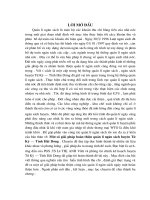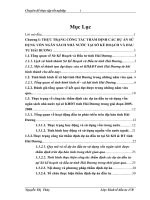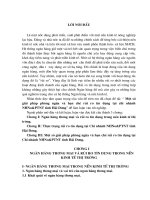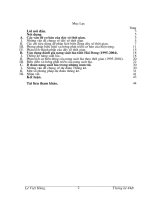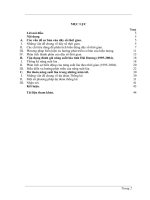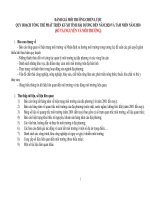sở gdđt tỉnh hải dương
Bạn đang xem bản rút gọn của tài liệu. Xem và tải ngay bản đầy đủ của tài liệu tại đây (121.19 KB, 3 trang )
<span class='text_page_counter'>(1)</span><div class='page_container' data-page=1>
<b>Sở GD-ĐT Tỉnh Hải Dương KIỂM TRA CLHK 1 - NĂM HỌC 2017 - 2018</b>
<b>Trường THPT Đoàn Thượng MÔN: Tiếng Anh</b>
<b> Thời gian: 45 phút </b>
<i>Họ tên học sinh: . . . .SBD: . . . .</i>
<b> MÃ ĐỀ 128 ( Gồm có 03 trang) </b>
<i><b>I. Mark the letter A, B, C, or D on your answer sheet to indicate the word or phrase that is CLOSEST </b></i>
<i><b>in meaning to the underlined part in each of the following questions.</b></i>
<b>Question 1: The medical community continues to make progress in the fight against cancer.</b>
<b> A. treatment</b> <b>B. improvement</b> <b>C. expectation </b> <b>D. speed </b>
<b>Question 2: Telecommunication is bound to have a huge influence on various aspects of our lives.</b>
<b> A. expect </b> <b>B. impact </b> <b>C. technique </b> <b>D. depression </b>
<i><b>II. Read the following passage and mark the letter A, B, C, or D on your answer sheet to indicate the </b></i>
<i><b>correct answer to each of the questions.</b></i>
For children over the age of 10, daily attendance at schools is not compulsory. Some of the older children
attend school only once or twice weekly to get tutorial support or instruction from a teacher. For the most
part, pupils are encouraged to work online from home. Students should complete a minimum number of
study hour per year; however, they may make up these hours by studying at home at times that suit their
family schedule. They can log on early or late in the day and even join live classes in other countries. In
order to ensure that each student is learning adequately, computer software will automatically monitor the
number hours a week each student studies on line as well as that student's learning materials and
assessment activities. Reports will be available for parents and teachers. The software can then identify
the best learning activities and conditions for each individual student and generate similar activities. It can
be also identify areas of week achievement and produce special programs adjusted to the students' needs.
<i><b>Question 3: What is the topic of the passage? </b></i>
<b> A. Computer software will make sure students learn at home</b>
<b> B. Students don't have to go to school any more</b>
<b> C. The effect of information technology on education </b>
<b> D. Students can know about their weak aspects to focus</b>
<i><b>Question 4: How many times are children who are older than 10 required to go to school weekly? </b></i>
<b> A. No time</b> <b>B. Four</b> <b>C. Three</b> <b>D. Once or twice </b>
<i><b>Question 5: Who/what counts the number of hours per week that students spend learning? </b></i>
<b> A. Parents </b> <b>B. Computers </b> <b>C. Teacher</b> <b>D. Virtual reality</b>
<i><b>Question 6: What can't the software do? </b></i>
<b> A. Design materials for the students</b> <b>B. Monitor the time the students learn</b>
<b> C. Identify weaknesses of the students </b> <b>D. Find out the best activities for the students</b>
<i><b>Question 7: What is NOT MENTIONED as a benefit of information technology to the students? </b></i>
<b> A. Students can stay at home to learn</b>
<b> B. Students' learning time won't be monitored </b>
<b> C. Students can learn at times that suit their schedule</b>
<b> D. Students' weak achievement can be identified.</b>
<i><b>III. Mark the letter A, B, C, or D on your answer sheet to indicate the word whose main stress is placed</b></i>
<i><b>differently from that of the rest in each of the following questions.</b></i>
<b>Question 8: A.existence</b> <b>B. development</b> <b>C. creativity </b> <b>D. impression</b>
<b>Question 9: A.pessimistic</b> <b>B. university</b> <b>C. compulsory </b> <b>D. education </b>
<i><b>IV. Read the following passage and mark the letter A, B, C, or D on your answer sheet to indicate the </b></i>
<i><b>correct word(s) for each of the blanks.</b></i>
<b>CULTURE SHOCK</b>
</div>
<span class='text_page_counter'>(2)</span><div class='page_container' data-page=2>
up that we are not sure how to deal with it. Societies are organized in many different ways. Customs and
<b>traditions can be very different and that can sometimes make it difficult (13) on with local people who</b>
might not approve of things you do and might object to things you say. You might be banned from doing
things in another country that are perfectly legal in your own. For example, in Singapore people can be
forced to pay a large fine just for dropping rubbish. Eventually, though, most people who live abroad fall
<b>in love with their adopted country and learn to accept (14) differences.</b>
<b>Question 10: A. in</b> <b>B. of</b> <b>C. on</b> <b>D. about</b>
<b>Question 11: A. Moreover</b> <b>B. Therefore</b> <b>C. However </b> <b>D. Although</b>
<b>Question 12: A. so</b> <b>B. quite </b> <b>C. very</b> <b>D. too</b>
<b>Question 13: A. that gets</b> <b>B. get</b> <b>C. getting</b> <b>D. to get </b>
<b>Question 14: A. their</b> <b>B. our</b> <b>C. its </b> <b>D. one’s</b>
<i><b>V. Mark the letter A, B, C, or D on your answer sheet to indicate the word or phrase that is </b></i>
<i><b>OPPOSITE in meaning to the underlined part in each of the following questions.</b></i>
<b>Question 15: In Western countries, it is polite to maintain eye contact during conversation.</b>
<b> A. insecure</b> <b>B. sociable</b> <b>C. informal</b> <b>D. rude</b>
<b>Question 16: I like secure job because I don’t like keeping on moving and changing all the time.</b>
<b> A. demanding</b> <b>B. unimportant</b> <b>C. challenging</b> <b>D. unstable</b>
<i><b>VI. Mark the letter A, B, C, or D on your answer sheet to indicate the sentence that is closest in </b></i>
<i><b>meaning to each of the following sentence.</b></i>
<i><b>Question 17: She went to the library so that she could borrow some books.</b></i>
<b> A. She went to the library that she could borrow some books.</b>
<b> B. She went to the library so as to borrow some books . </b>
<b> C. So as to go to the library, she could borrow some books.</b>
<b> D. She went to the library so as to she could borrow some books.</b>
<i><b>Question 18: Although Bill took a taxi, he still arrived late for the concert. </b></i>
<b> A. Bill arrived late for the concert in spite of the taxi. </b>
<b> B. Although Bill took a taxi, he can’t come to the concert in time. </b>
<b> C. Despite taking a taxi, Bill still arrived late for the concert. </b>
<b> D. Bill arrived late for the concert because he takes a taxi. </b>
<i><b>Question 19: My friend Ann has decided to buy a motorbike. Her car was stolen last week.</b></i>
<b> A. My friend Ann, her car was stolen last week, has decided to buy a motorbike.</b>
<b> B. My friend Ann, who was stolen her car last week, has decided to buy a motorbike.</b>
<b> C. My friend Ann, whose car was stolen last week, has decided to buy a motorbike.</b>
<b> D. My friend Ann, who her car was stolen last week, has decided to buy a motorbike.</b>
<i><b>Question 20: “Who does this ball belong to?” the mother asked.</b></i>
<b> A. The mother asked who did that ball belong to.</b>
<b> B. The mother asked who does that ball belong to.</b>
<b> C. The mother wanted to know who that ball belonged to.</b>
<b> D. The mother told who that ball belonged to.</b>
<i><b>VII. Mark the letter A, B, C, or D on your answer sheet to show the word whose underlined part is </b></i>
<i><b>pronounced differently from that of the others in the same group</b></i>
<b>Question 21: A.travelled</b> <b>B. concentrated </b> <i><b>C. interviewed</b></i> <i><b>D. considered</b></i>
<b>Question 22: A.wipes</b> <i><b>B. attacks</b></i> <b>C. threatens</b> <i><b>D. contributes</b></i>
<i><b>VIII. Mark the letter A, B, C, or D on your answer sheet to show the underlined part that needs </b></i>
<i><b>correcting</b></i>
<b>Question 23: That’s the young man whom (A) we met him (B) at the bus-stop (C) last week, isn’t it </b>
<b>(D)? </b>
</div>
<span class='text_page_counter'>(3)</span><div class='page_container' data-page=3>
<b>Question 25: It took (A) them at least (B) two months learning (C) how to pronounce (D) these words. </b>
<b>Question 26: The influence of the nation’s (A) literature, art, and science (B) have (C) captured </b>
<b>widespread (D) attention. </b>
<i><b>IX. Mark the letter A, B, C, or D on your answer sheet to show the answer that best fits in each gap in </b></i>
<i><b>the following questions</b></i>
<b>Question 27: Ben would have studied medicine if he _______ to a medical school.</b>
<b> A. </b>would be able to enter <b>B. was admitted </b> <b>C. had been admitted </b> <b>D. had admitted</b>
<b>Question 28: An economic _______ is a time when there is very little economic activity, which causes a </b>
lot of unemployment and poverty.
<b> A. mission</b> <b>B. depression </b> <b>C. development </b> <b>D. improvement</b>
<b>Question 29: Without my parents' support, I _______ my overseas study. </b>
<b> A. had not completed </b> <b>B. will not complete </b> <b>C. did not complete</b> <b>D. would not have </b><sub>completed</sub>
<b>Question 30: She is a friendly girl who gets _______ everyone she meets. </b>
<b> A. into</b> <b>B. on with </b> <b>C. away from </b> <b>D. out of</b>
<b>Question 31: Since the global industrialization, the number of animal species _______ have become </b>
extinct or nearly extinct has increased.
<b> A. whose</b> <b>B. when </b> <b>C. why </b> <b>D. which </b>
<b>Question 32: In the future, the number of tiny but _______computers you encounter every day will </b>
number in the thousands, perhaps millions.
<b> A. powerful </b> <b>B. power </b> <b>C. powerfully </b> <b>D. powered</b>
<b>Question 33: _______ at home, I would enjoy my favourite show.</b>
<b> A. If were I</b> <b>B. Suppose I am </b> <b>C. Unless were I </b> <b>D. Were I </b>
<b>Question 34: While she was cooking with her mother in the kitchen, her brothers _______ to the radio.</b>
<b> A. were listening </b> <b>B. listened</b> <b>C. has listened</b> <b>D. was listening</b>
<b>Question 35: “ It was nice of you to give me the present. Thank you” Ben said to Mary.</b>
Ben thanked Mary_______the present.
<b> A. for giving him</b> <b>B. of giving him</b>
<b> C. that she had been nice to give him</b> <b>D. it had been nice of her to give him </b>
<b>Question 36: Hannah: “Thanks for your help, Julia.”Julia: “_______.”</b>
<b> A. It’s my pleasure </b> <b>B. With all my heart </b> <b>C. Yes. You should do that</b> <b>D. Never remind me </b>
<i><b>X. Listen and decide whether the statement are True (A) or False (B)</b></i>
<b>Question 37 : There aren’t so many things to do in Tokyo.</b>
<b>Question 38 : People are noisy in the street.</b>
<b>Question 39 : The air is clean.</b>
<b>Question 40 : Everything in New York is so expensive</b>
</div>
<!--links-->
